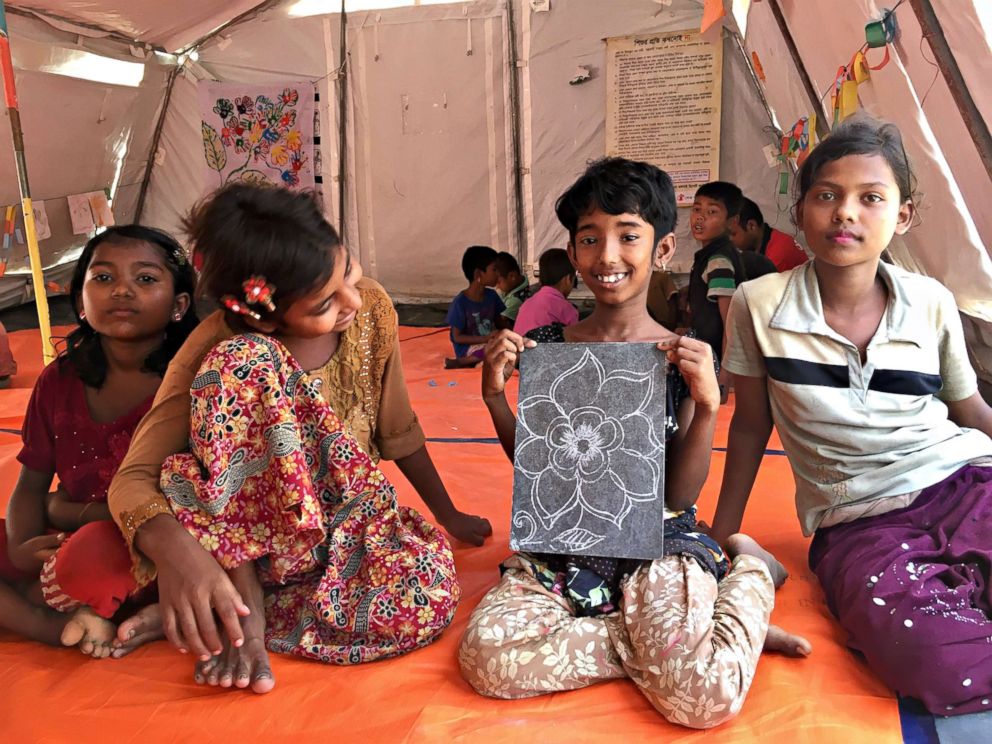For Rohingya and supporters, a fight for survival on the ground and on social media
The Rohingya are considered one of the most persecuted groups in the world.
— -- At 5 a.m., a group of 50 Rohingya appear on the shores of Bangladesh, like ghostly figures.
Fleeing brutal oppression in Myanmar, they come in search of safety and shelter on Bangladesh's shore. It's a heartbreaking scene.
The Rohingya have been traveling by boat from Myanmar since 2 a.m. and they have just arrived. They are barefoot, starving and shell-shocked. Fear and exhaustion are etched on their faces and they carry their belongings in just a few plastic bags. The bags are all they have left.
Through a translator, an older man told ABC News that the military, some monks and some local Rakhine state people had burned their homes down and taken their animals.
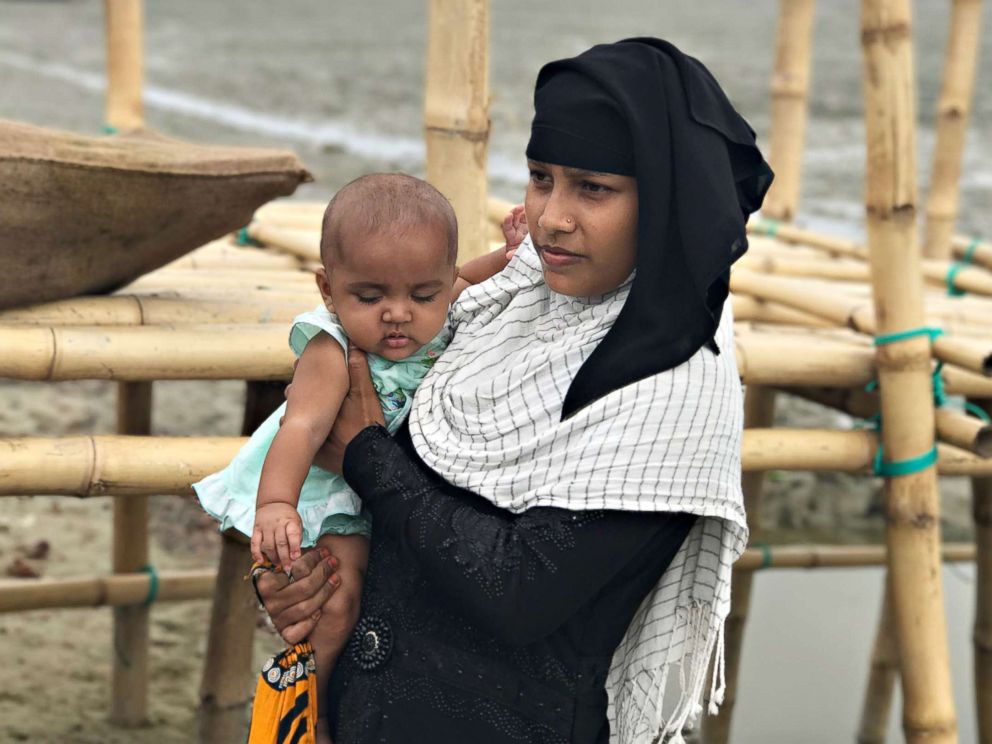
"We have no freedom of movement. They would tell us we could move for a few hours but they would grab us once we left our homes and torture us. That is why we fled," he said. "We have no rights. ... We don't have anything. ... We cannot feed our children. We cannot eat."
Pope Francis arrives in Myanmar to cheers, Rohingya diplomatic test
No place to call home for Rohingya, facing abuse and attacks
The Rohingya are a Muslim minority and considered one of the most persecuted groups in the world. The United Nations says they are victims of "textbook ethnic cleansing" perpetrated by the Buddhist Myanmar military.
U.S. Secretary of State Rex Tillerson also said in a recent statement: "After a careful and thorough analysis of available facts, it is clear that the situation in northern Rakhine state constitutes ethnic cleansing against the Rohingya."
Recently the head of the Myanmar military seemed to dispute their very existence.
"I would like to make sure the world knows there are no Rohingya in Myanmar," Senior Gen. Min Aung Hlaing said. "The people living in the Rakhine state are Bengali."
And even Pope Francis, during his recent visit to Myanmar, refrained from saying the name "Rohingya" out loud during a speech.
"Religious differences need not be a source of division and distrust," the pontiff said.
Since Aug. 25, the United Nations says, 625,000 Rohingya refugees have fled from northern Rakhine state in Myanmar.
A humanitarian crisis
The government of Myanmar has said that its latest crackdown was in response to attacks by the Rohingya militant group known as Arakan Rohingya Salvation Army (ARSA). However, 360,000 Rohingya that have fled are noncombatant children.
With thousands more leaving, the scale of the humanitarian crisis is unprecedented.
Hundreds of international aid workers and volunteers have been arriving at Cox's Bazar Airport in Bangladesh to help the Rohingya after hearing the stories of their suffering.
"I'm here because I think it is a tragedy that people should die from lack of availability to access the most basic of health-care services and quite frankly I've been extremely lucky in life and I like [to] give back when I can," said John Trumbo, a retired pediatrician from San Antonio, Texas.
Nat Crewe, a member of the Australian Disaster Response Group, described the conditions his team had seen while on the ground.
"The team has seen everything -- gunshots, moms being covered in acid, kids killed, babies shot," Crewe said. "These people have been burned out of their houses. Their whole villages have been razed to the ground by fire."
The need is overwhelming, aid workers say.
Mark Pierce, Save the Children's country director for Bangladesh, said there is a lot of fear among the Rohingya.
"Kids experienced a lot of trauma [and] distress having seen things they should never have seen," Pierce said.
He said if international aid groups did not help, the Rohingya would die.
"They are coming in exhausted and hungry and in a very weakened state," he said. "I've seen mothers who walked 50 kilometers, 60 kilometers for 10 days to get to the Bangladesh border."
'A children's crisis'
Shelters blanket the hills on both sides of the road, south of Cox's Bazar. The entire region is a sea of black and blue tarps as far the eye can see. After a 45-minute hike through a camp, ABC News reached a Save the Children mobile health clinic where the conditions were dire. Pierce said this particular clinic had been established recently.
He told ABC News the Rohingya crisis was really "a children's crisis."
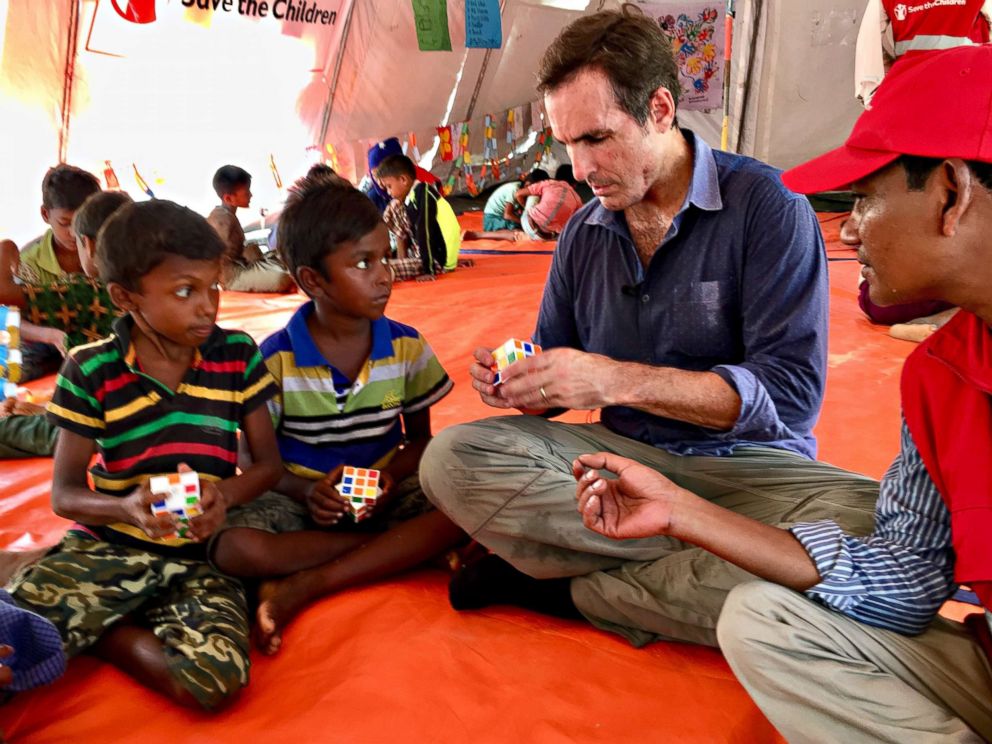
"Yeah, 60 percent of the 600,000 that have crossed the border are children," Pierce said. "This is really the front line of the response in terms of health. This is the furthest-most point in the refugee camps and this is where some of the greatest needs are. We are literally racing to contain a health crisis before it explodes and spreads."
At a UNICEF feeding center in Kutupalong refugee camp, a woman told ABC News that she and her family had arrived at the camp 10 to 15 days ago from Myanmar. She said the journey had taken seven to eight days on foot. Her 6-month-old son now weighed 8 pounds, about as much as an average newborn, according to the Centers for Disease Control and Prevention.
"He is losing weight every day," the woman said via translator. "He is eating but not that much. ... When we fled, we left with three days' provision but it took us eight days."
At one Save the Children site, children are using play, art and dance to work through the trauma. Government numbers show that more than 40,000 children have lost one or both parents and nearly 2,000 are head of households.
"When the military people came to our house and started breaking and burning out home, they killed my father," 10-year-old Jena said. "They shot him dead. They killed my father. I'm very sad that I lost my father."
With her mother very ill, Jena has to work to provide for the family.
"I go to the forest here. I collect firewood and sell it in the market," she said. "I earn money so that I can buy things for my family."
Jena said she remembered the day her family fled Myanmar.
"I saw with my own eyes, people who are killed by the military and chopped into pieces," she said through a translator. "They burned my house but not only my house. Every house next to my house was burning. We all ran from our houses and together we fled. ... Anyone the military caught was slaughtered. After they were shot or stabbed, they were cut into many pieces, put inside plastic bins and thrown into the river."
Matt Smith, CEO of Fortify Rights, has been documenting the atrocities against the Rohingya for years. Recently, he shared his research, in conjunction with the U.S. Holocaust Museum, in a report titled "They Tried to Kill Us All."
"The Myanmar military systematically burned villages down. Women and girls were raped. We've documented situations of mass gang rape. Infants and children were killed, in some cases thrown into fires," Smith told ABC News earlier this year.
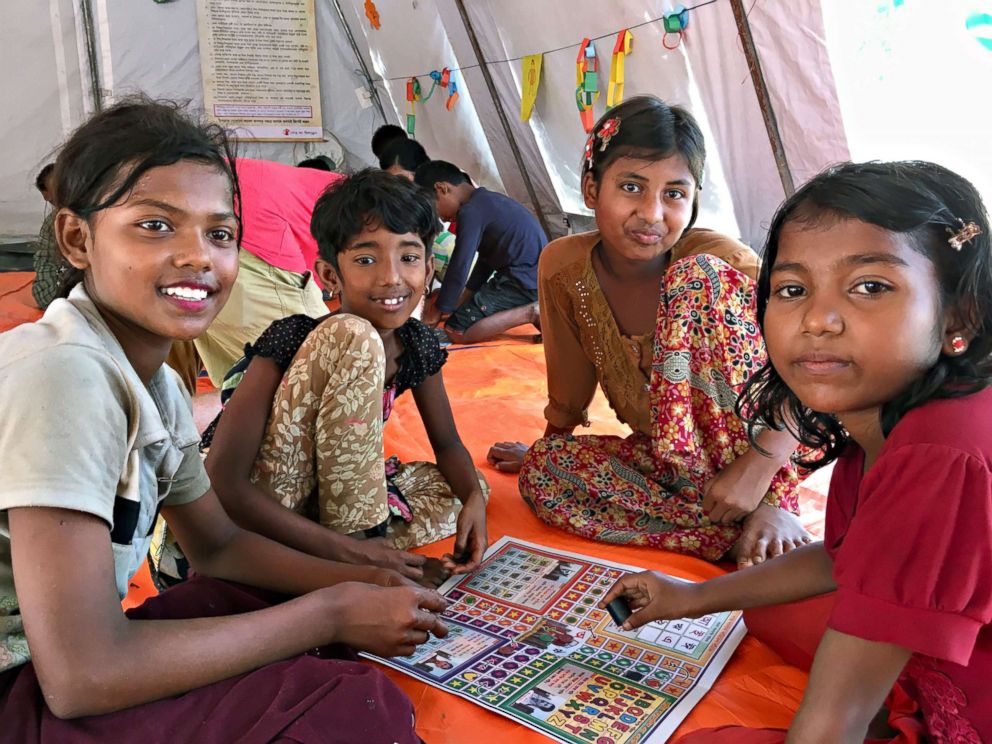
Myanmar official responds to allegations
The Myanmar military has denied that it's committed any crimes and released the findings of an internal investigation exonerating itself.
In a statement posted to Facebook on Nov. 13, the military said: "Security forces did not commit shooting at innocent villagers and sexual violence and rape cases against women. They did not arrest, beat and kill the villagers. They did not totally destroy, rob and take property."
Click here for the military's full statement posted to Facebook.
ABC News traveled to Myanmar to try to get answers after State Counsellor Aung San Suu Kyi invited the international media to visit northern Rakhine state. The capital city of Nay Pyi Taw boasted wide avenues, highly manicured streets and large hotels, but the city was nearly empty.
During an interview with Dr. Win Myat Aye, Myanmar's union minister, minister of social welfare, relief and resettlement, ABC News asked about the Rohingya in Bangladesh who told stories of family members being killed, beaten and raped at the hands of the Myanmar military.
"You believe all the things that they said. So why don't you believe me?" Aye said. "I frequently visit that part, myself, as the witness. What I have seen and what I have heard. You are hearing about their words from outside. Why don't you believe me?"
Aye said the U.N.'s allegations of ethnic cleansing were not true.
"It's not ethnic cleansing because we are not making it happen," he said. "It's happening by itself."
He also told ABC News that the team could not travel to northern Rakhine state.
"It's very difficult because of security," he said. "For security and freedom of movement, you have to wait and that's the answer. I can't answer anymore."
Myanmar official responds to allegations
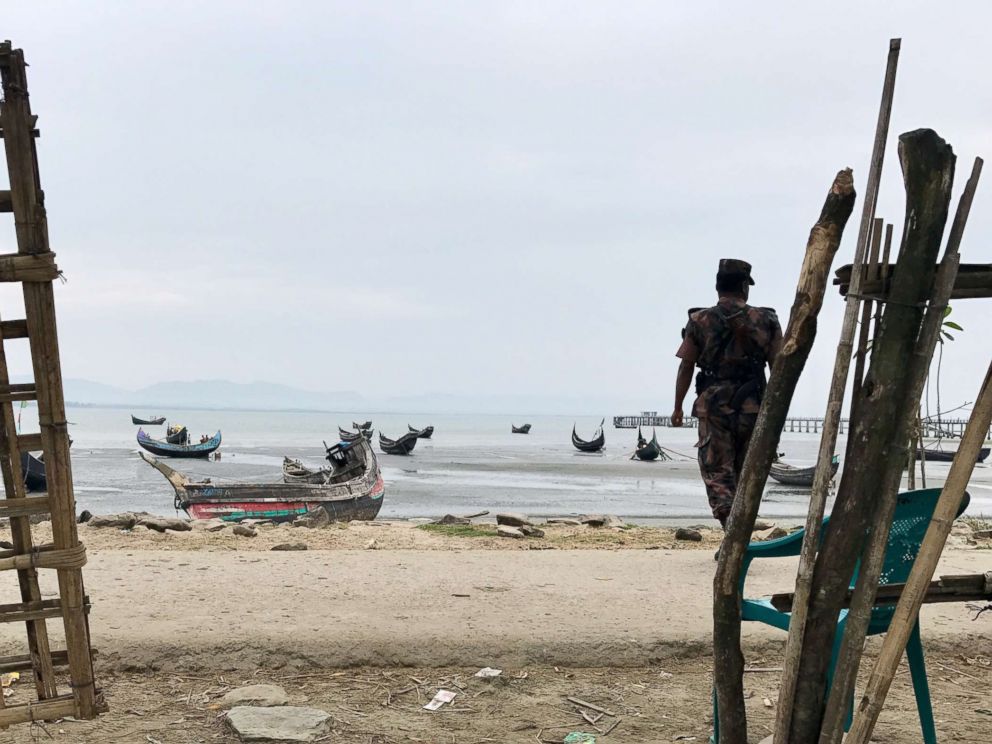
With nearly 1 million people packed in tightly and the population growing daily, life in the camps is a struggle. Yet, just being in the camps means for the Rohingya that they have survived.
"They ran here to save their lives," said Zahid Hassan of UNICEF Bangladesh. "One thing that I have seen is this sense of relief. They're not afraid here. They don't think that someone will kill them. But, in Myanmar, they were afraid."
The journey to Bangladesh is long and harrowing.
At Shah Porir Dwip Island, thousands of Rohingya have recently crossed into Bangladesh but reaching the island is not easy. Once, refugees arrive, they must wait to be processed and then must make their way to the camps, which are several miles away.
One group making the trek told ABC News that they'd been walking for 15 days and that their last meal had been four days ago. They said they were starving.
"Our houses were burned. We lost everything," one man said through a translator. "Military. We saw them burning our homes. ... Many were killed."
According to one Bangladesh border guard, 700 refugees had already passed through that morning.
The social media battle
In Myanmar, everything is tightly controlled, especially social media. Because international news outlets are highly censored, most local people get their news via social media.
At a bus stop, ABC News spoke with one man.
"Can we ask you about the Rohingya issue?" ABC News asked.
"I don't know that much but I, what I know is that I see them as terrorists, you know, who attack the Rakhine state. Not Rohingyas, they are terrorists," he said.
When ABC News asked whether the Rohingya are terrorists, the man said: "So, I don't have exact information but I could gather information from the Facebook."
"What does it say on Facebook about them?" ABC News asked.
"They want to occupy our land and people," he said.
U Parmaukkha, a Buddhist monk, said the Western media had created the story that the Rohingya were killed by the Myanmar military.
"These Muslim people, these Rohingya people, they have planned to occupy Rakhine state as their Islamic state," the monk said. "The news produced by the Western media is completely wrong."
Parmaukkha said the children ABC News had spoken to who said they'd witnessed the killings by the military were lying.
"They are ordered to lie," the monk said. "I do not believe that the military killed their parents."
Nicky Diamond, a George W. Bush fellow and human rights specialist with Fortify Rights, has been tracking hate speech in Myanmar for several years. He's now also tracking the use of "fake news," or the spreading of deliberate misinformation.
Diamond said speaking out against the government could be dangerous for him and his family.
"I have been followed by special agents," he said. "If I'm going on a trip, all the time I'll call my family and all the time I worry. ... 'What will happen to my family or happen to me?'"
He said if he posted something related to the Rohingya situation, his account would be suspended by Facebook because users would report him.
"That is a kind of psychological manipulation to gain support or to shape public opinion. ... That's working. ... We've been documenting abuses perpetrated by, most of the case, military officers. They don't like those kinds of discussions," Diamond said.
ABC News reached out to Facebook, which said, in part: "In Myanmar, people post content to discuss and draw awareness to the issues. ... Although some of this content may otherwise violate our Community Standards that restrict the sharing of graphic and violent content, we allow this type of content to be shared when there is significant public interest value. However, where content contains hate speech. ... In a way that targets people based on their religion and ethnicity, we remove it when reported to us."
Despite the dangers, Diamond said he'd continue his advocacy.
"I'll never stop what I'm doing," he said.
